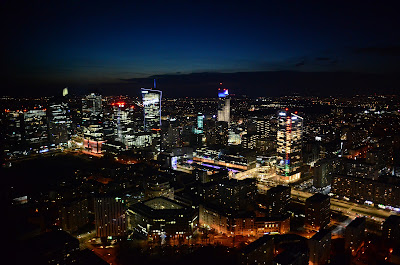Normal blogging resumes from today; there will be more localist photography and fewer spiritual and philosophical musings. For the time being anyway...
On 21 March, I had the chance to visit the Varso tower for the first time - the EU's tallest building, opened late last year. Below: Warsaw skyline looking west from Warszawa Śródmieście. Skyscrapers from the left: LIM tower, Central tower, Varso Place (centre), the Lumen building by Złote Tarasy, and Złota 44 ('Żagiel', or the Sail).
From the 43rd floor, the views, shortly after nightfall, were spectacular. Impressive city, Warsaw - what you are gazing down upon was nothing but rubble 78 years ago. Below: looking north, along ulica Towarowa/ul. Okopowa.
Left: looking down on the Palace of Culture, with Złote Tarasy in the foreground. A long-held dream of mine. My dream was to be able to do this from 360 degrees - Stalin's gift to the people of Warsaw ringed by supertall skyscrapers, each one higher than it, rendering it invisible when looking at the Warsaw skyline from a distance.
This might never happen - the shift to remote work, resulting from Covid and IT, means that corporates need less floor-space for their offices, and so the rush to build supertalls has slowed right down.
Below: once a familiar sight in railway stations and airports around the world, the flip-over destination indicator board has almost completely been replaced by LCDs. Warsaw's Śródmieście station still has some; they will not be around very long. Known across former communist Europe as the Pragotron (after the city of Prague, where the company that manufactured them, Elektročas, was based). Working off punch-cards, the mechanical complexity of these devices (and lack of spares) means their days are coming to an end. The flik-flik-flik-flik sound of the destinations flipping over as a train departs will soon be history. Make sure you take a conscious note of it before it goes.
Earlier in the month, I got out of Warsaw on two business trips.
Below: leaving Szczecin station at daybreak, having come up on the night train.
Animal spirits, animal consciousness
This time three years ago:
A myriad paths to God
This time four years ago:
No God for those who don't believe, a God for those that do
This time five years ago:
Work proceeding around Jeziorki
This time six years ago:
Karczunkowska reopens to traffic
This time ten years ago:
Goodness gracious!
Cycling and recycling
This time 12 years ago:
Winter clings on to the forest
This time 13 years ago:
Toyota launches the iQ
This time 15 years ago:
Old school Łódź




















No comments:
Post a Comment